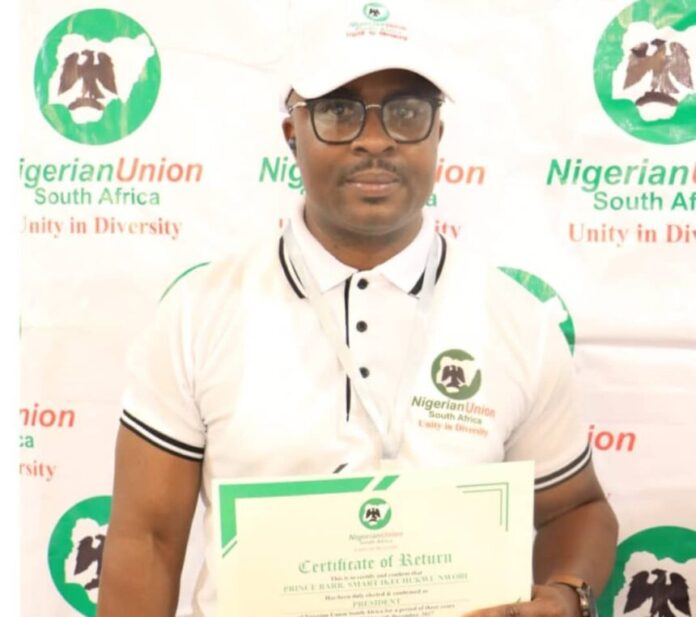Tensions between Nigerian business owners and South African authorities have escalated after an alleged illegal raid on multiple businesses located in the Navy House, Fatima Building, Pretoria Central. The raid, which reportedly resulted in extensive property damage and asset seizures, has sparked outrage within the Nigerian community in South Africa, leading to formal complaints and growing demands for justice.
On January 17, 2025, Nigerian business owners operating from the building began notifying the Nigerian Union in South Africa (NUSA) about the raid, which they claim was orchestrated by a joint task force. The team, made up of the Department of Home Affairs, South African Police Service (SAPS), Metro Police, City of Tshwane authorities, and Gauteng traffic officers, was part of a larger citywide initiative called “Reclaim Our City.” While the goal of the initiative is to enforce city bylaws, the Nigerian business owners argue that the execution of the operation went beyond acceptable legal boundaries.
“The operation was far from a standard by-law enforcement action. What transpired was a systematic attack on our businesses, leading to damage and illegal confiscation of valuable goods,” said Smart Nwobi, the President of NUSA, in an interview on Tuesday. He further condemned the operation, stating, “The joint task force not only seized items but caused deliberate destruction in their wake, damaging both property and livelihoods.”
Unraveling the Raid: Property Damage and Seizures
According to a statement issued by the union, which was signed by NUSA’s National Publicity Secretary, Akindele Olunloyo, the raid was characterised by the systematic removal of valuable commercial assets. Business owners reported that officials seized expensive products, including Brazilian hair extensions, high-end hairpieces, electronics such as televisions and microwaves, as well as salon equipment like dryers and tongs.
One affected business owner, who wished to remain anonymous for fear of further retaliation, recounted the shocking events: “I saw the police coming in with large vans. They started grabbing everything from the shelves. It was like they were clearing out everything we had. Not just the products but even the money in our safes was taken. They didn’t leave a single item behind.”
Beyond the seizures, the raid’s most alarming aspect was the reported destruction of property. The union claims that the officials went to great lengths to dismantle surveillance systems installed by the business owners, including CCTV cameras and recording equipment. The destruction allegedly targeted not only the cameras but also the ceilings, with officials reportedly tearing through the structure in an apparent attempt to erase evidence.
“The damage was not just about taking goods. The destruction was well-planned,” said Olunloyo. “CCTV cameras were removed and destroyed in a way that seemed intentional, as if they didn’t want anyone to have proof of their actions.”
Growing Tensions and Legal Actions
In response to the incident, NUSA quickly mobilized its executives, including Nwobi, to visit the scene and assess the situation. The union has called for a thorough investigation into the raid and has demanded that the South African authorities return the seized goods and compensate the affected businesses for the damages.
“We have already filed an official complaint with the South African Police Service (SAPS) at the Pretoria Central Station under case reference number CAS 385/1/2025,” Nwobi confirmed. “The affected shop owners deserve justice, and we are determined to ensure that the proper legal channels are pursued to rectify this situation.”
The raid has also led to increasing concerns within the Nigerian business community in South Africa. Many fear that the attack may be part of a wider pattern of targeting foreign nationals and their businesses, particularly those owned by Nigerians, who have often faced xenophobic violence and discrimination in South Africa in the past.
“The Nigerian community here has always worked hard to contribute to the economy,” said one business owner, who preferred not to be named for security reasons. “We have always followed the law, paid our taxes, and respected the city’s regulations. But this is beyond just an enforcement issue. This is harassment.”
Background: The “Reclaim Our City” Initiative
The “Reclaim Our City” initiative, launched by the City of Tshwane authorities, is designed to restore order in central Pretoria, focusing on enforcing municipal by-laws, removing illegal structures, and clearing unauthorized businesses. While the goal is to enhance city planning and infrastructure, its implementation has been criticized for disproportionately targeting foreign nationals and informal businesses.
Many in the Nigerian community feel that such operations are a pretext for the seizure of goods from immigrant-run businesses. “We understand that enforcement is necessary, but it must be done fairly and within the law,” said Nwobi. “What happened on January 17 was not an enforcement of law; it was a violation of rights.”
The operation was reportedly carried out without proper legal documentation or clear communication, raising concerns among foreign nationals about the lack of transparency in these operations. The Nigerian Union has demanded that the South African government take immediate action to address the allegations and ensure that such incidents do not occur in the future.
Calls for Justice and Accountability
The Nigerian government has also been alerted to the incident, and NUSA has called for diplomatic intervention. “This attack on our citizens cannot go unnoticed. We urge the Nigerian government to step in and support its citizens in South Africa,” Nwobi emphasized.
The Union has vowed to continue its fight for justice for the affected business owners, and they are rallying other Nigerian nationals in South Africa to stand in solidarity. “We will not let this injustice go unchallenged,” Nwobi declared.
The South African government has yet to make an official statement on the matter, but the incident is expected to provoke further discussions about the treatment of foreign nationals, particularly Nigerian businesses, within the country. As investigations continue, the future of the “Reclaim Our City” initiative may be called into question, with many urging for reforms to ensure that such actions do not infringe upon the rights of foreign business owners.

